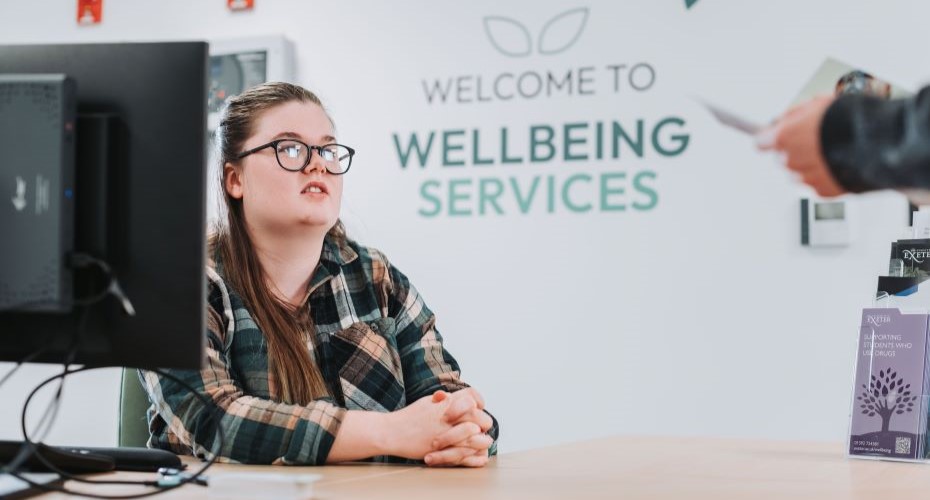“Whatever doesn’t kill you makes you stronger”
Friedrich Nietzsche
This quote perfectly captures the reality of uni life. Going to university is a major life change, and while it’s challenging for everyone, it can be especially tough for those dealing with mental health struggles. I consider myself one of those people.
My name is Albina, and I’m a Law student who has just finished my first year at uni. I want to share some of the struggles I’ve faced on this journey – and how I managed to stay grounded and grow stronger along the way.
I’m originally from Ukraine, and moving to the UK at 17 was already a big transition. Even before I started Sixth Form, my anxiety was overwhelming. I worried about meeting people with completely different mentalities, adapting to a new education system, and simply not knowing what to expect. At the same time, I was filled with hope; I imagined my life turning into an American teen drama.
But the reality didn’t meet my expectations. I didn’t make many friends, life didn’t feel particularly fun, and I struggled academically at first. So, by the end of Year 13, the thought of going to uni filled me with dread.
My anxiety about university was intense. I overthought everything – what to pack, how much money I needed, whether I’d get along with my flatmates or make any friends at all. After a tough time at school, I kept asking myself: What if I don’t find my people? What if I can’t afford it? What if I’m not good enough to study law?
My parents, also navigating life in a new country, weren’t in a position to offer much help. So, the pressure of responsibility landed entirely on me. I started to doubt whether I’d made the right decision. The fear of ending up in debt from a wrong choice weighed heavily.
But I had a dream to become a lawyer, and I reminded myself that nothing good comes without risk. If you don’t try and put yourself in uncomfortable situations, you’ll never grow.
And you know what? Choosing Exeter made that risk worth it. I’m so grateful for the support I’ve received from the University of Exeter, the Students’ Guild, and my peers. All those initial struggles have made me mentally stronger.
Now, I want to help others who might be going through similar challenges and share some of the things that helped me navigate uni with mental health struggles.
Parents’ concerns
You parents might be concerned about how you’re going to cope at uni, and that’s completely valid because they care for you. However, knowing that they’re worried can also make you doubt yourself. Talking from personal experience, you just need to reassure them that everything is going to be fine, this way – you’ll reassure yourself as well.
Some common parents’ concerns can be:
- What if my child can’t cope with academic pressure? You could reassure your parents that unis offer academic support like study workshops, office hours, and extensions when needed. You could also tell them about university wellbeing services to give them confidence that you know where to go for mental health support if you need it.
- What if my child feels lonely and doesn’t make friends? Parents worry their child will be isolated, especially if they’ve struggled socially before. You can explain that building friendships takes time, but there are so many ways to meet people – through group chats, societies, and even just saying hi in the kitchen.
- Will they know how to take care of themselves? This is a valid concern as before going to uni your parents might help you a lot. To help them not worry so much, you could start practising life sklls before coming to uni and show them that you can take care of yourself – for example you could clean your room or cook dinner for your parents. Also, explain to them that it’s okay to learn through trial and error because most people do.

Common misconceptions
“Everyone else is doing fine except me.”
It often seems like everyone is thriving, especially on social media, but many students struggle quietly with stress, anxiety, loneliness, or burnout.
“If I’m struggling, I must have chosen the wrong course or uni.”
Feeling low doesn’t mean you made the wrong choice – it just means you’re human. Transitions are hard, and it takes time to adjust.
“Talking about mental health is a sign of weakness.”
Reaching out is actually a strength. The earlier you speak up, the more support you can get. And you can find all the support you need at the University of Exeter.
“Everyone finds friends straight away.”
Some people click instantly, but many others take weeks or months to find their crowd. It’s normal to feel lonely at first.
“Struggling with mental health means I won’t succeed academically.”
Lots of students with anxiety, depression, or other conditions still do really well. With the right support and strategies, success is completely possible.
“You should already know how to be independent.”
No one expects you to know how to manage everything from day one. It’s a learning process, and struggling with independence is completely normal.
Tips on how to prepare mentally
A big part of coping with uni life, especially if you struggle with your mental health, is starting your preparation early.
Even a little bit of planning can make your transition much smoother and help reduce the shock of suddenly finding yourself in a new environment, often alone. As an overthinker, I found it incredibly important to plan everything in advance – from what to pack, to how to meet people, to where to go if I needed help. This gave me a sense of control and eased some of my anxiety before I even arrived.
So, here are some things you can do before you come to uni to help protect your mental health and feel a little more prepared:
1. Start building your connections before you arrive
If you’re worried about making friends or finding “your people” at uni, you’re not alone. This is one of the most common fears students have, and the good news is that there are ways to ease that worry before you even step on campus.
One of the best things you can do is join university-related group chats. Look for ones on Snapchat, Facebook, WhatsApp, Instagram, or even Reddit. There are usually groups for freshers, your course, your accommodation block, and even societies or interests you might want to join.
Engaging in these chats early gives you the chance to:
- Start conversations and break the ice with people in the same boat.
- Arrange to go to the first lecture, society event, or welcome party with someone, even if you’ve only chatted online; having a friendly face makes a huge difference.
- Realise that most people are just as nervous as you are, and talking about your worries can feel really comforting.
- Ask questions about things you’re unsure about – whether that’s how Freshers’ Week works or what to bring for your flat kitchen. You’ll often get helpful answers from other students or even those already at the uni.
- You can also connect with current students as they’ve already been through what you’re experiencing now, so they can give you honest advice and reassurance. Try reaching out to student ambassadors or people you find on social media. Most are happy to answer questions or just share their experience.

If you’re starting Exeter in September 2025, you can join the University’s official Facebook groups for new students at the Streatham and St Luke’s campuses or Penryn campus, and / or join the Instagram broadcast channel via the main Instagram page.
2. Try to explore resources available on the internet
You can find so many helpful things online that will make you feel more prepared and less anxious. For example, there are loads of videos on what to pack on YouTube or Exeter’s social media accounts. You can also find lots of blogs on different topics, and I’m sure you’ll come across one that relates to you and can help answer some of your questions! Moreover, explore Exeter’s website which has answers to a lot of practical things, like moving-in dates, when to make payments, or how to access financial and wellbeing support. I’ve attached some useful links below:
Wellbeing services: https://www.exeter.ac.uk/students/wellbeing/
Financial support: https://www.exeter.ac.uk/study/funding/undergraduate/support/
3. Practice doing everything by yourself
This will be a big part of your settling-in process, so it’s a good idea to practice before you leave home. Try cooking different meals for yourself, and if you’re not used to cleaning regularly, then start now. Keep yourself busy with things you’ll be doing at uni. It will help you smoothly adjust to the routine. The key is to make yourself disciplined. If you can do it at home, you can do it at uni – the only difference is the location.
4. If you struggle with mental health problems such as anxiety, start practising techniques you can use on your own when no one is around
his way, you’ll already know what helps you by the time you arrive. You can try breathing exercises like the 4-7-8 technique – inhale for 4 seconds, hold for 7, and exhale for 8. The goal is to find something that works for you and gives you a sense of calm when things get overwhelming.
Preparation can definitely help ease your nerves before going to uni, as it makes you feel like you’ve got things under control, and trust me, you absolutely have!
Support you can get at University of Exeter
There is lots of support available in University of Exeter, from wellbeing to help with your visa if you’re an international student. And it’s okay to ask for help, nobody will judge you as lots of students reach out for support.
1. Wellbeing services
There are loads of wellbeing services available at the University of Exeter, which I’ve linked below. These include 24/7 support like the NHS Urgent Mental Health Line or Estate Patrol, who can help with any security, safety or welfare concerns. I actually had to call them once when another student needed help, and they were really responsive and arrived quickly.
There’s also The Moorings at Devon service, which offers mental health support to anyone over 18 in Devon.
If you’re living in student accommodation, you’ll have access to support from the Residence Life Team, including your residence mentor who is usually a student who used to live in your accommodation. They’re super easy to talk to, and they regularly check in with students to make sure everyone’s doing okay. You can always talk to them about anything that’s on your mind.
You can also book an appointment with the wellbeing team directly through the University website. If you’re a new student starting in September, you can find useful wellbeing information here, including a helpful checklist for before you start.
Wellbeing services: https://www.exeter.ac.uk/students/wellbeing/
2. Tutor
You’ll also have an academic tutor, who you can talk to about any academic concerns or challenges. But it’s not just about grades, academic struggles can affect our confidence and mental health too. That’s why it’s important to stay in touch with your tutor. They’re really supportive and can often help more than you think.
3. Societies
Most societies at Exeter have a wellbeing officer, and many organise events aimed at improving students’ mental health. For example, some offer art therapy sessions, where you can sit with like-minded people and paint – it’s a great way to unwind.
Joining a society is honestly one of the best things you can do at uni. Keeping yourself busy with something you enjoy, while connecting with people who share your interests, can really help shift your focus away from your worries and make you feel more grounded. So don’t be afraid to try something new – whether it’s a sport, a creative hobby, or something completely random!
4. Students’ Guild
The Guild is the student union at the University of Exeter, and they also provide loads of mental health and wellbeing support – from wellbeing workshops to helpful articles on different topics related to mental health.
They also run peer support groups for different kinds of struggles students face, and there are peer support schemes like mature student mentoring, where you’re matched with a more experienced student who can offer advice and guidance based on their own experience.
Here’s the link to explore more about peer support: https://www.exeterguild.com/kb/peer-support
5. Friends
And finally – your friends. Never underestimate the power of just having someone to talk to. Often, your friends are going through similar things, even if they don’t show it. Sometimes all it takes is one honest conversation to feel like a weight’s been lifted.
Don’t be afraid to open up, whether it’s about homesickness, anxiety, or just having a bad day. You’ll be surprised how many people say, “I feel the same.” Supporting each other, even in small ways, makes such a difference.

Going to uni with mental health struggles isn’t easy, I know that first-hand. But it doesn’t mean you’re not capable, and it definitely doesn’t mean you’re alone. Everyone adjusts at their own pace, and struggling at first doesn’t mean you’ve made the wrong choice.
What really matters is that you take things one step at a time, ask for help when you need it, and remind yourself that it’s okay not to have it all figured out. You’re not meant to.
You’re stronger than you think, and this experience will shape you in the best way possible, even if it’s uncomfortable at first. Be kind to yourself, take care of your mental health, and don’t be afraid to reach out.

